教学课件 --人教版中学英语七年级(下)UNIT 4 Section B 1a-1d(第3课时)
文档属性
| 名称 | 教学课件 --人教版中学英语七年级(下)UNIT 4 Section B 1a-1d(第3课时) | 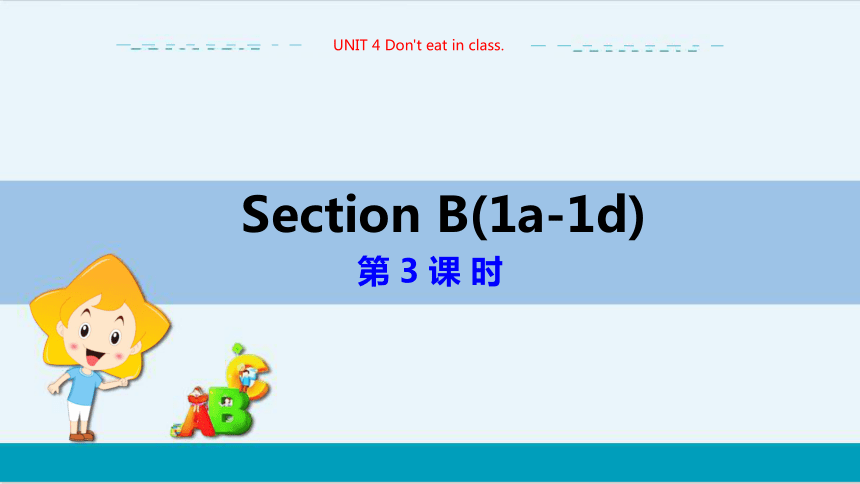 | |
| 格式 | pptx | ||
| 文件大小 | 4.0MB | ||
| 资源类型 | 试卷 | ||
| 版本资源 | 人教新目标(Go for it)版 | ||
| 科目 | 英语 | ||
| 更新时间 | 2024-02-21 19:48:02 | ||
图片预览

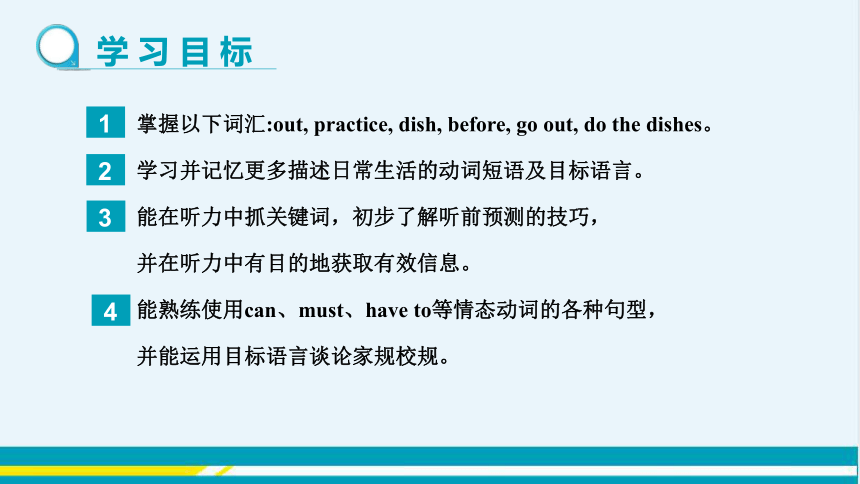
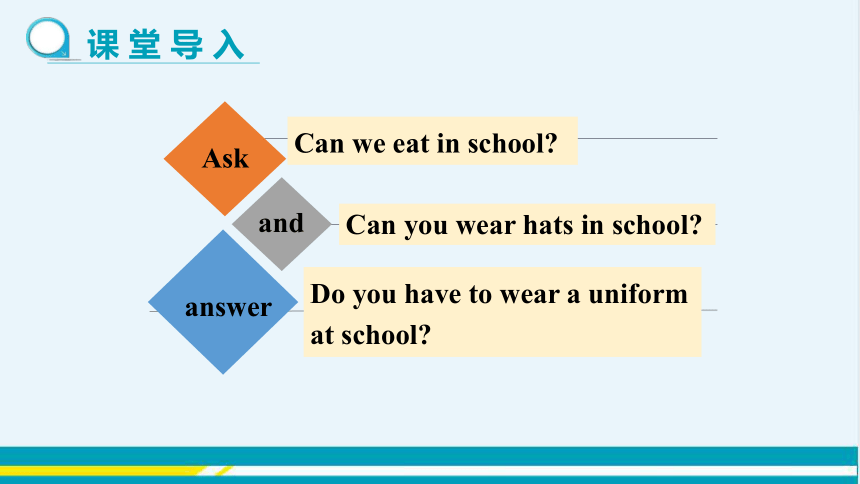
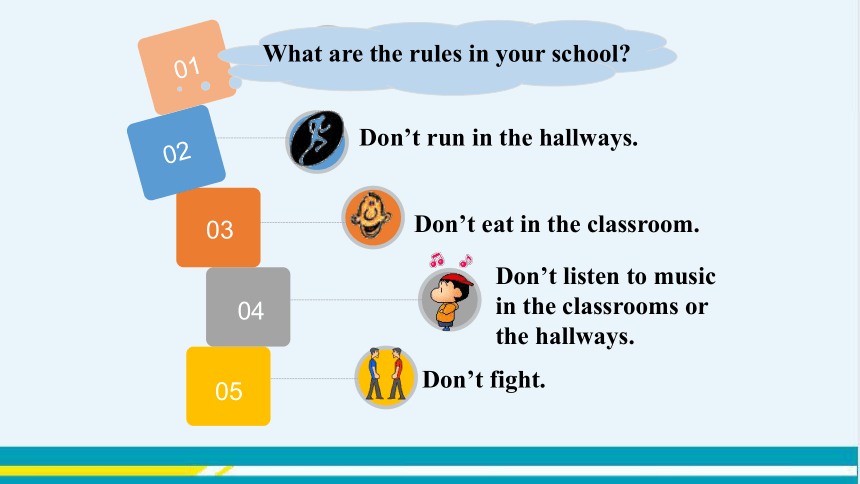
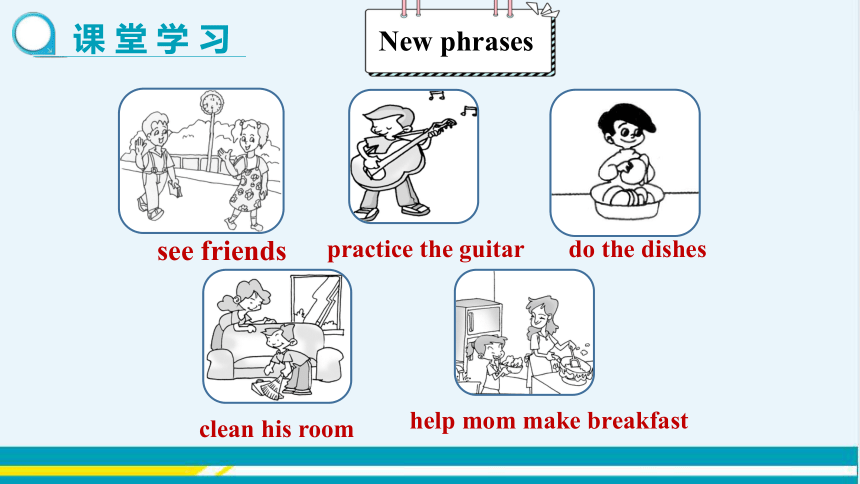
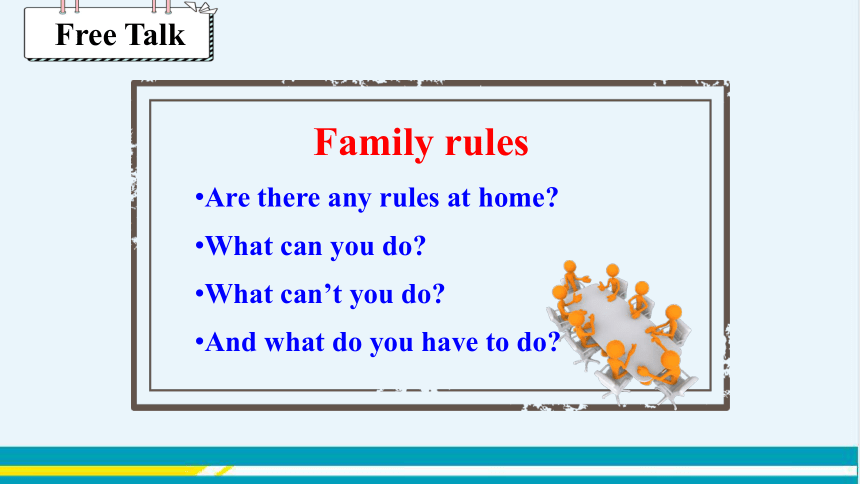
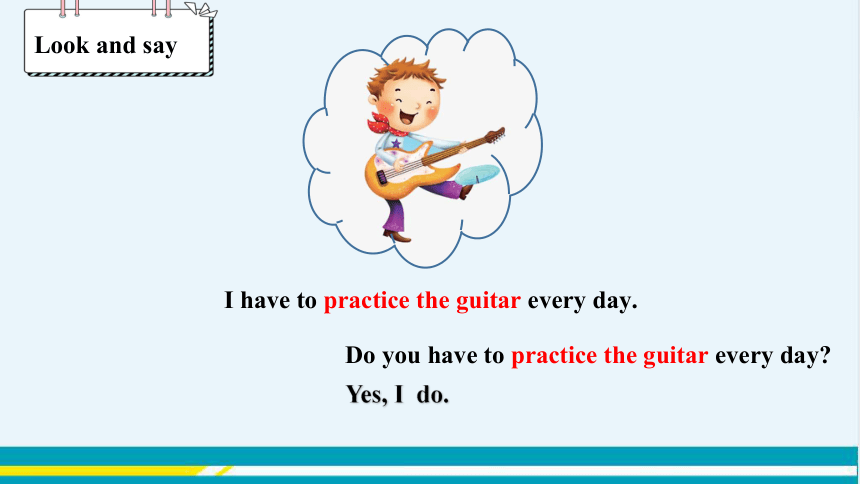
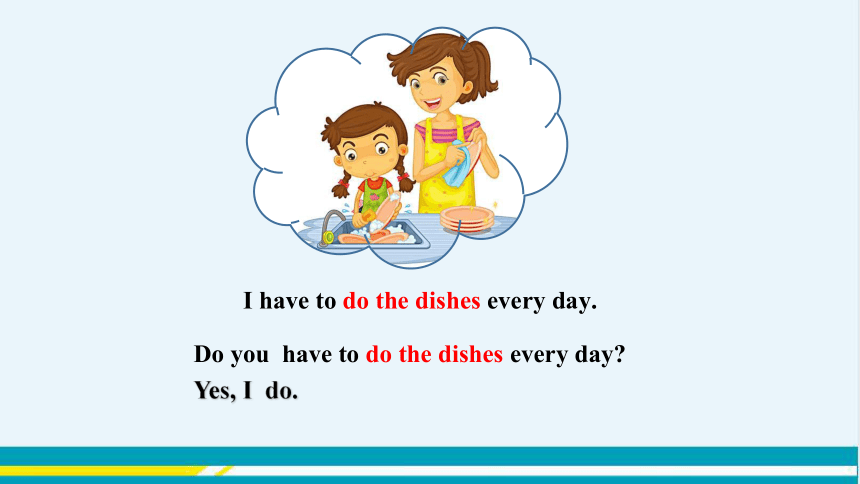
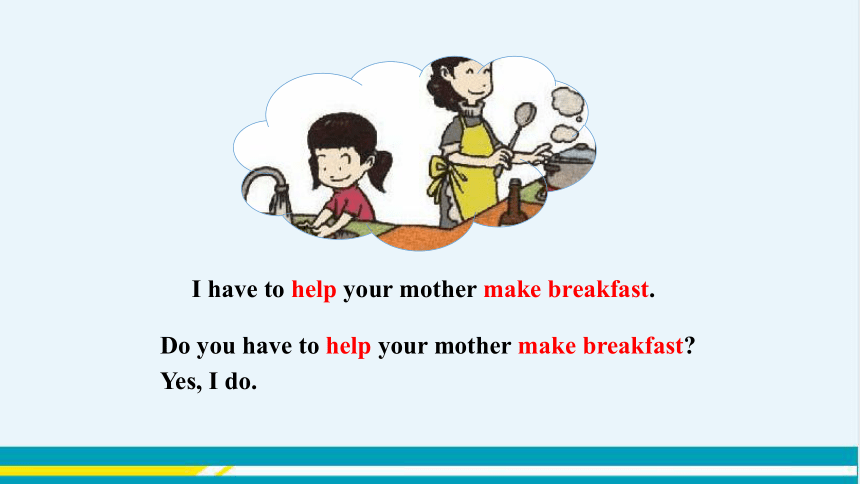
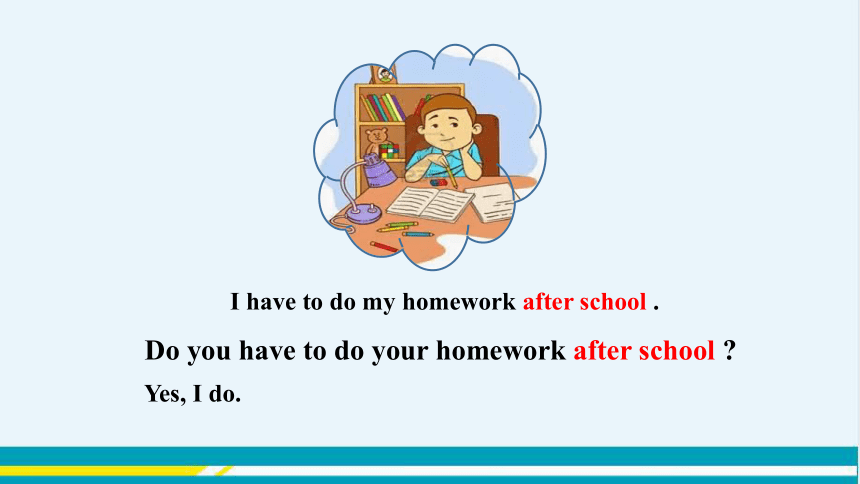
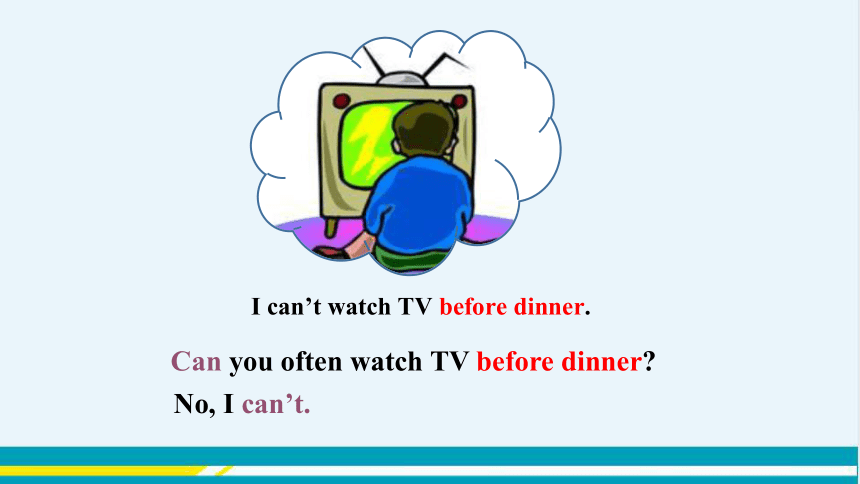
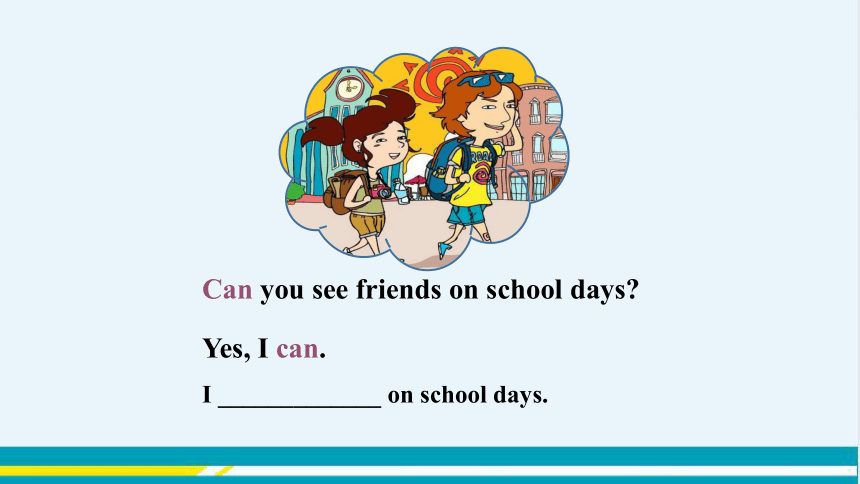
文档简介
(共31张PPT)
Section B(1a-1d)
UNIT 4 Don't eat in class.
第 3 课 时
学 习 目 标
掌握以下词汇:out, practice, dish, before, go out, do the dishes。
学习并记忆更多描述日常生活的动词短语及目标语言。
能在听力中抓关键词,初步了解听前预测的技巧,
并在听力中有目的地获取有效信息。
能熟练使用can、must、have to等情态动词的各种句型,
并能运用目标语言谈论家规校规。
1
2
3
4
Can we eat in school
Can you wear hats in school
answer
and
Ask
Do you have to wear a uniform at school
课 堂 导 入
05
04
03
02
Don’t run in the hallways.
Don’t eat in the classroom.
Don’t listen to music in the classrooms or the hallways.
Don’t fight.
01
Don’t arrive late for class.
What are the rules in your school
New phrases
see friends
practice the guitar
help mom make breakfast
clean his room
do the dishes
课 堂 学 习
Are there any rules at home
What can you do
What can’t you do
And what do you have to do
Family rules
Free Talk
Do you have to practice the guitar every day
Yes, I do.
I have to practice the guitar every day.
Look and say
Do you have to do the dishes every day
Yes, I do.
I have to do the dishes every day.
Do you have to help your mother make breakfast
Yes, I do.
I have to help your mother make breakfast.
Do you have to do your homework after school
I have to do my homework after school .
Yes, I do.
Can you often watch TV before dinner
No, I can’t.
I can’t watch TV before dinner.
Can you see friends on school days
Yes, I can.
I _____________ on school days.
Can you go out on school days
No, I can’t.
I _________________________________.
What does Dave do
Rules
_____ go out
_____ see friends
_____ do his homework
_____ practice the guitar
_____ do the dishes
_____ watch TV
_____ help his mom make breakfast
_____ clean his room
Read the rules in the chart in 1b. Then match the pictures [a-h] with the rules.
h
c
e
b
g
d
f
a
1a
Rules Can’t Have to/ Must When
_____ go out
_____ see friends
_____ do his homework
_____ practice the guitar
_____ do the dishes
_____ watch TV
_____ help his mom make breakfast
_____ clean his room
Listen and put an × for things Dave can’t do and a √ for things he has to do.
(×)
(√)
a
h
c
e
b
g
d
f
×
×
×
√
√
√
√
√
on school nights
1b
Listen again. Write when Dave has to follow the rules in the chart in 1b. Choose from the phrases in the box.
1c
on school nights every Saturday before dinner in the evening
on school days after dinner after school every morning
Rules Can’t Have to/ Must When
_____ go out
_____ see friends
_____ do his homework
_____ practice the guitar
_____ do the dishes
_____ watch TV
_____ help his mom make breakfast
_____ clean his room
(×)
(√)
a
h
c
e
b
g
d
f
×
×
×
√
√
√
√
√
on school nights
after school
before dinner
after dinner
in the evening
every morning
every Saturday
on school days
观察与思考
在具体某一天用介词_______。
在具体的时间点前面用介词 ____。
在某个季节、某年、某月都用介词________。
on school nights on Saturday in the evening
on school days in summer at 6 o’clock
on
in
at
当 morning,afternoon,evening有前置定语或后
置定语限定时,就不用in而用on。
Write down Dave’s family rules.
1. He can’t go out on school nights.
2. He can’t see his friends on school days.
3. He has to do his homework after school.
4. He must practice the guitar before dinner.
5. He has to do the dishes after dinner.
6. He can’t watch TV in the evening.
7. He has to help his mom make breakfast every morning.
8. He must clean his room every Saturday.
Pair work
Talk about the rules in Dave’s family.
Can Dave go out
on school nights
No, he can’t.
1d
Group work
Write about your own family rules in groups.
See which group can say the most family rules.
Name Have (Has) to Can’t
I
Jim
…
Report: In my group, I have to … I can’t … Jim has to … He can’t…
Show time
Language points
I must practice the guitar before dinner and then I have to do the dishes after dinner.
我必须在晚饭前练习吉他并且在晚餐后洗餐具。
(1)must情态动词,意为“必须”,强调主观的义务和必要。
You must finish your homework first.你必须先完成作业。
(2)practice意为“操练,练习”,主要用法:
practice sth.练习某事物
practice doing sth.练习做某事
(3)do the dishes=wash the dishes意为“洗碗”。
2. Me, too. I have to help my mom make breakfast every morning .
我也是。我不得不每天早上帮妈妈做早餐。
(1)Me, too意为“我也是”,省略前面相同的肯定结构句,
Me neither意为“我也不是”,省略前面相同的否定结构句。
--I like going swimming on weekends.我喜欢在周末去游泳。--Me too.我也是。
--I don’t lik drinking coffee.我不喜欢喝咖啡。--Me neither. 我也不喜欢。
(2)every morning意为“每天早上”,是一般现在时的时间状语。
I get up at 6 o’clock every morning.我每天早上6点钟起床。
3. Wow, you do have a lot of rules.
哇,你的确有太多的规定了。
(1)do放在实义动词之前表示强调,意为“确实、实在”。
I do clean my room every day.我确实每天打扫房间。
(2)a lot of=lots of意为“许多”,后接可数名词复数或不可数名词。
I have a lot of work to do.我有许多工作要做。
课 堂 达 标
1. He often helps me ______ the classroom.
A. cleaned B. cleaning C. cleans D. clean
2. My sister Linda practices ______ the piano every day.
A. play B. plays C. to play D. playing
3. Don't go out ______ school nights.
A. for B. in C. at D. on
单项填空
4. —Do we have to clean the room
—______.
A. Yes, we are B. Yes, we need C. No, you don't D. No, you can't
5. Can you play ______ guitar ______ weekends
A. a; in B. the; in C. the; on D. /; on
1. Write down ten sentences about what you can or can’t do in your house.
2. Talk what you can do and can’t do to make our city better.
Homework
Thank you !
Section B(1a-1d)
UNIT 4 Don't eat in class.
第 3 课 时
学 习 目 标
掌握以下词汇:out, practice, dish, before, go out, do the dishes。
学习并记忆更多描述日常生活的动词短语及目标语言。
能在听力中抓关键词,初步了解听前预测的技巧,
并在听力中有目的地获取有效信息。
能熟练使用can、must、have to等情态动词的各种句型,
并能运用目标语言谈论家规校规。
1
2
3
4
Can we eat in school
Can you wear hats in school
answer
and
Ask
Do you have to wear a uniform at school
课 堂 导 入
05
04
03
02
Don’t run in the hallways.
Don’t eat in the classroom.
Don’t listen to music in the classrooms or the hallways.
Don’t fight.
01
Don’t arrive late for class.
What are the rules in your school
New phrases
see friends
practice the guitar
help mom make breakfast
clean his room
do the dishes
课 堂 学 习
Are there any rules at home
What can you do
What can’t you do
And what do you have to do
Family rules
Free Talk
Do you have to practice the guitar every day
Yes, I do.
I have to practice the guitar every day.
Look and say
Do you have to do the dishes every day
Yes, I do.
I have to do the dishes every day.
Do you have to help your mother make breakfast
Yes, I do.
I have to help your mother make breakfast.
Do you have to do your homework after school
I have to do my homework after school .
Yes, I do.
Can you often watch TV before dinner
No, I can’t.
I can’t watch TV before dinner.
Can you see friends on school days
Yes, I can.
I _____________ on school days.
Can you go out on school days
No, I can’t.
I _________________________________.
What does Dave do
Rules
_____ go out
_____ see friends
_____ do his homework
_____ practice the guitar
_____ do the dishes
_____ watch TV
_____ help his mom make breakfast
_____ clean his room
Read the rules in the chart in 1b. Then match the pictures [a-h] with the rules.
h
c
e
b
g
d
f
a
1a
Rules Can’t Have to/ Must When
_____ go out
_____ see friends
_____ do his homework
_____ practice the guitar
_____ do the dishes
_____ watch TV
_____ help his mom make breakfast
_____ clean his room
Listen and put an × for things Dave can’t do and a √ for things he has to do.
(×)
(√)
a
h
c
e
b
g
d
f
×
×
×
√
√
√
√
√
on school nights
1b
Listen again. Write when Dave has to follow the rules in the chart in 1b. Choose from the phrases in the box.
1c
on school nights every Saturday before dinner in the evening
on school days after dinner after school every morning
Rules Can’t Have to/ Must When
_____ go out
_____ see friends
_____ do his homework
_____ practice the guitar
_____ do the dishes
_____ watch TV
_____ help his mom make breakfast
_____ clean his room
(×)
(√)
a
h
c
e
b
g
d
f
×
×
×
√
√
√
√
√
on school nights
after school
before dinner
after dinner
in the evening
every morning
every Saturday
on school days
观察与思考
在具体某一天用介词_______。
在具体的时间点前面用介词 ____。
在某个季节、某年、某月都用介词________。
on school nights on Saturday in the evening
on school days in summer at 6 o’clock
on
in
at
当 morning,afternoon,evening有前置定语或后
置定语限定时,就不用in而用on。
Write down Dave’s family rules.
1. He can’t go out on school nights.
2. He can’t see his friends on school days.
3. He has to do his homework after school.
4. He must practice the guitar before dinner.
5. He has to do the dishes after dinner.
6. He can’t watch TV in the evening.
7. He has to help his mom make breakfast every morning.
8. He must clean his room every Saturday.
Pair work
Talk about the rules in Dave’s family.
Can Dave go out
on school nights
No, he can’t.
1d
Group work
Write about your own family rules in groups.
See which group can say the most family rules.
Name Have (Has) to Can’t
I
Jim
…
Report: In my group, I have to … I can’t … Jim has to … He can’t…
Show time
Language points
I must practice the guitar before dinner and then I have to do the dishes after dinner.
我必须在晚饭前练习吉他并且在晚餐后洗餐具。
(1)must情态动词,意为“必须”,强调主观的义务和必要。
You must finish your homework first.你必须先完成作业。
(2)practice意为“操练,练习”,主要用法:
practice sth.练习某事物
practice doing sth.练习做某事
(3)do the dishes=wash the dishes意为“洗碗”。
2. Me, too. I have to help my mom make breakfast every morning .
我也是。我不得不每天早上帮妈妈做早餐。
(1)Me, too意为“我也是”,省略前面相同的肯定结构句,
Me neither意为“我也不是”,省略前面相同的否定结构句。
--I like going swimming on weekends.我喜欢在周末去游泳。--Me too.我也是。
--I don’t lik drinking coffee.我不喜欢喝咖啡。--Me neither. 我也不喜欢。
(2)every morning意为“每天早上”,是一般现在时的时间状语。
I get up at 6 o’clock every morning.我每天早上6点钟起床。
3. Wow, you do have a lot of rules.
哇,你的确有太多的规定了。
(1)do放在实义动词之前表示强调,意为“确实、实在”。
I do clean my room every day.我确实每天打扫房间。
(2)a lot of=lots of意为“许多”,后接可数名词复数或不可数名词。
I have a lot of work to do.我有许多工作要做。
课 堂 达 标
1. He often helps me ______ the classroom.
A. cleaned B. cleaning C. cleans D. clean
2. My sister Linda practices ______ the piano every day.
A. play B. plays C. to play D. playing
3. Don't go out ______ school nights.
A. for B. in C. at D. on
单项填空
4. —Do we have to clean the room
—______.
A. Yes, we are B. Yes, we need C. No, you don't D. No, you can't
5. Can you play ______ guitar ______ weekends
A. a; in B. the; in C. the; on D. /; on
1. Write down ten sentences about what you can or can’t do in your house.
2. Talk what you can do and can’t do to make our city better.
Homework
Thank you !
同课章节目录
- Unit 1 Can you play the guitar?
- Section A
- Section B
- Unit 2 What time do you go to school?
- Section A
- Section B
- Unit 3 How do you get to school?
- Section A
- Section B
- Unit 4 Don't eat in class.
- Section A
- Section B
- Unit 5 Why do you like pandas?
- Section A
- Section B
- Unit 6 I'm watching TV.
- Section A
- Section B
- Review of Units 1-6
- Unit 7 It's raining!
- Section A
- Section B
- Unit 8 Is there a post office near here?
- Section A
- Section B
- Unit 9 What does he look like?
- Section A
- Section B
- Unit 10 I'd like some noodles.
- Section A
- Section B
- Unit 11 How was your school trip?
- Section A
- Section B
- Unit 12 What did you do last weekend?
- Section A
- Section B
